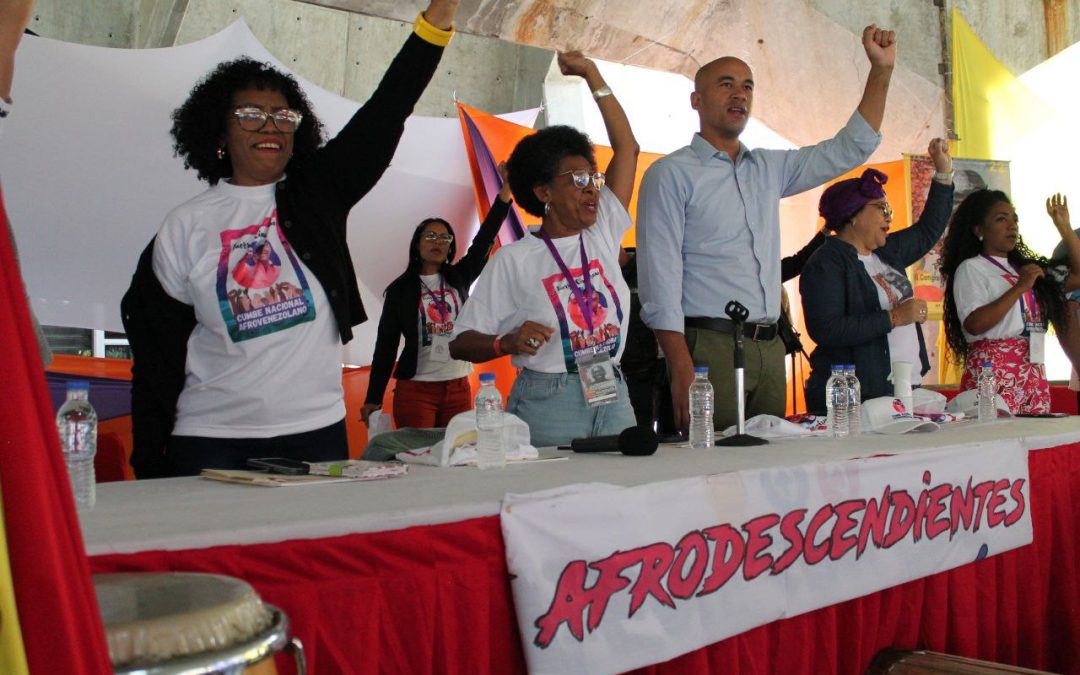
Miranda state governor, Héctor Rodríguez, next to Casimira Monasterios (left), during the closing ceremony of the third Afro-Venezuelan National Congress in Caracas, Sunday, February 26, 2023. Photo: Miranda Governor Office.

Orinoco Tribune – News and opinion pieces about Venezuela and beyond
From Venezuela and made by Venezuelan Chavistas

Miranda state governor, Héctor Rodríguez, next to Casimira Monasterios (left), during the closing ceremony of the third Afro-Venezuelan National Congress in Caracas, Sunday, February 26, 2023. Photo: Miranda Governor Office.
The closing of the third Afro-Venezuelan National Congress, held last weekend, in the Venezuelan School of Planning, La Rinconada, Caracas, gave way to the creation of the National Afro-Venezuelan Cumbe, the structure of which had the approval of more than 17 delegations present in the debates held on Saturday February 25 and Sunday February 26.
Cumbes were egalitarian communities where people who had escaped slavery joined forces with the Indigenous peoples to live freely on the margins of the Spanish empire, in the words of Joel Galíndez, a Venezuelan comunero interviewed by Venezuelanalysis.com.
The event dedicated a posthumous tribute to the memory of Aristóbulo Istúriz (an Afro-descendant former parliamentarian) and Norma Romero (former president of National Council for the Development of Afro-descendant Communities of Venezuela, also known as Conadecafro), and was attended by the minister for culture, Ernesto Villegas, minister for communes, Jorge Arreaza, minister for women and gender equality, Diva Guzmán, in addition to deputies Casimira Monasterios, María León, Asia Villegas, and Gabriela Peña. Marizabel Blanco Sifontes, president of Conadecafro, Jesús “Chucho” García, researcher and defender of the African diaspora, and the Afro cultist Emilio Mújica, were also present.
“The structure [of the National Afro-Venezuelan Cumbe] comes from below,” Deputy Monasterios explained, “from the framed territory, from the mandate of Commander Chávez: Commune or nothing! Except, that we call the communes cumbe.”
“[This will be accomplished] with revolutionary ethics, with runaway ethics, because without revolutionary ethics there is no revolution possible,” Monasterios said. “Let us be an example for our country, as our runaways were in the midst of dark slavery.” In the National Afro-Venezuelan Cumbe, Afro-descendants will come together in order to minimize the exploitation of some beings by others.
She recalled the recognition of Commander Hugo Chávez to the Afro population in Yaracuy, adding, “he was the first Venezuelan President, who made our race visible and recognized himself as Afro-descendant.”
Héctor Rodríguez, governor of Miranda and national coordinator of the congress of the new era, noted that the National Afro-Venezuelan Cumbe should not only be limited to the presence of the Afro-descendant community, but to all the communities of the country.
“We have a lot to offer Afro-descendant men and women,” he said, “we have the necessary values for the construction of society, without neglecting the defense of spaces and rights, and demanding public and security policies to put an end to the historical imbalance that generates exclusion.”
Diva Guzmán, minister for women and gender equality, noted that “one of the sectors that can give the most contribution to change and cultural transformation is precisely our Afro-descendant sector, something that can help consolidate unity.”
#EnVideo📹| Representante del Movimiento Afrovenezolano, Casimira Monasterios, rememoró cuando el Comandante Hugo Chávez se reconoció como afrodescendiente, convirtiéndolo en el único presidente de Venezuela en reconocerlo.#JuntosPorLaPatria pic.twitter.com/GGJvlVvCJn
— VTV CANAL 8 (@VTVcanal8) February 26, 2023
“Our Afro-descendant peoples, their heritage and luminous creativity, are an essential part of the identity of the homeland,” said Jorge Arreaza, minister for communes, “especially in times of resistance and popular renaissance.”
“We all come from there, from Africa, humanity was born there,” stated Arreaza, while referring to the fundamental value of the Cumbe, other than solidarity: “it is work itself, work as a value; Commander Chávez told us that socialism differs from capitalism in that, it is not capital that determines [structure], but work.”
Arreaza highlighted the importance of the declaration of the National Afro-Venezuelan Cumbe, and considered it as “an immense advance; and now we are working together because the great National Afro-Venezuelan Cumbe has to be based on the Communal Cumbes, to add ourselves in a great national Cumbe with the characteristics of the Afro-descendants.”
La Afrovenezolanidad: A Historiography of the Black Experience in Venezuela
The minister urged strengthening the model on work. “We must discuss how we are going to add artificial intelligence to our work model in a constructive way; we have to give this debate,” he stated. “In the Communal Cumbe, we must propose three elements, that consist of reaffirming life, viability, and consensus, which is a method for decision-making, and you must design the method to transform the institutions. That is the challenge we have with participatory democracy for a society of equals.”
Deputy María León also formalized the proposal to create a Ministry for Afro Peoples, as part of the patriotic commitment of the Revolution.
(Venezuelan Presidency Office) by Cindy Díaz, with Orinoco Tribune content
Translation: Orinoco Tribune
OT/JRE/AU